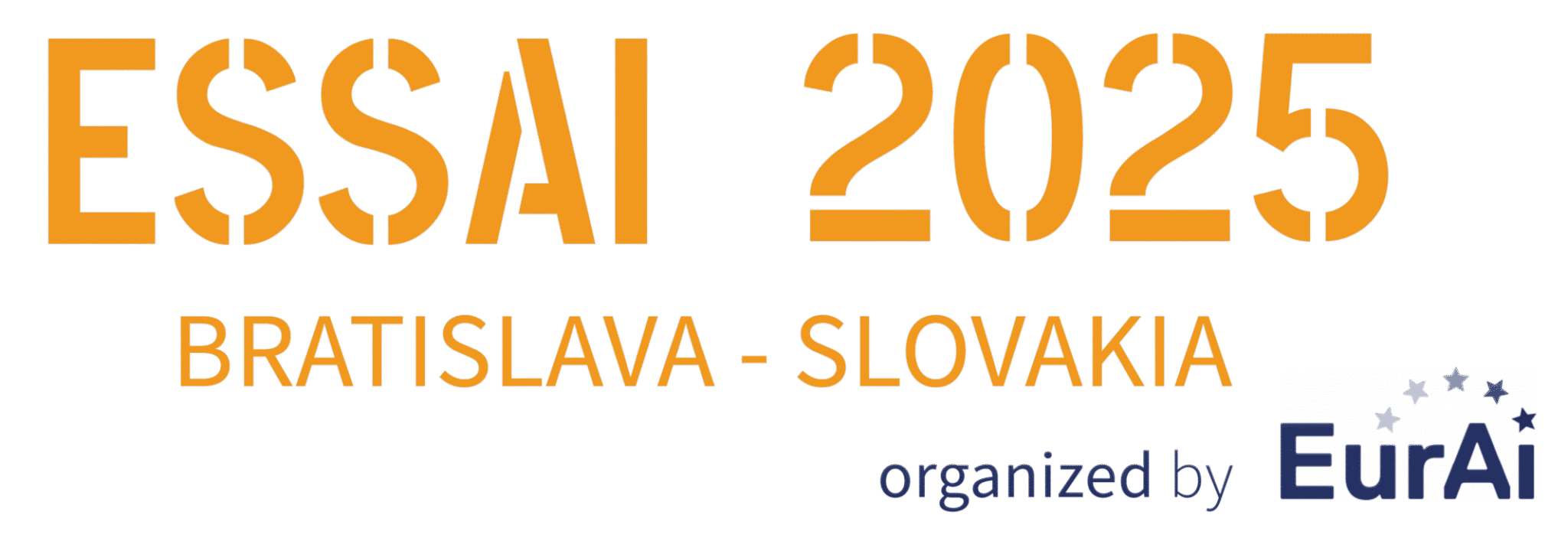Important Dates
December 8, 2024
Course preliminary details (mandatory).
January 8, 2025
Full course proposal submission.
January 31, 2025
Notification of acceptance or rejection.
Topics and Format of Course
ESSAI aims to cover all subdisciplines of AI and the interactions between them. Proposals for courses at ESSAI 2025 are invited in all areas of Artificial Intelligence, including but not limited to the following:
Autonomous Agents and Multi-agent Systems (MAS)
Causality and Causal Learning (CL)
Ethical, Legal and Social Aspects of AI (ELS)
Foundation Models (FM)
Knowledge Representation and Reasoning (KR)
Learning Theory (LT)
Natural Language Processing (NLP)
Neuro-Symbolic Learning and Reasoning (NSLR)
Planning & Strategic Reasoning (PLAN)
Reinforcement Learning (RL)
Robotics (ROB)
Safe, Explainable and Trustworthy AI (SET)
Search & Optimization (SO)
Supervised and Unsupervised Learning (ML)
Vision (VIS)
Each course will consist of five 90-minute lectures offered daily (Monday-Friday) in the week that the school will take place.
Course Categories
Each proposal should fall under one of the following two categories.
Introductory Courses
Introductory courses are intended to introduce a research area of AI to students, young researchers, and other non-specialists, and to foster a sound understanding of its basic methods and techniques. Such courses should enable researchers from related disciplines to develop some comfort and competence in the topic considered. Introductory courses in a cross-disciplinary area may presuppose general knowledge of the related disciplines.
Advanced Courses
Advanced courses are targeted primarily to graduate students who wish to acquire a level of comfort and understanding of current research in an area of AI. While introductory courses will typically focus on one subarea of AI only, advanced courses are encouraged to present a broader perspective on AI, and they should be of interest beyond a single specific area.
Course Proposal Guidelines
To be considered, course proposals should closely adhere to the following guidelines. Courses must be presented by lecturers who submitted the proposal. For courses with more than two lecturers, the role of each lecturer should be clearly explained and justified in the proposal. Course proposals should explicitly state the intended course category. Proposals for introductory courses should indicate the intended level, for example, as it relates to standard textbooks and monographs in the area. Proposals for advanced courses should specify the prerequisites in detail.
Submitted proposals should include all of the following:
- Contact information for each proposer: Name, affiliation, address, email, web page.
- General proposal information: Title, category.
- Information about the course content:
- Abstract of up to 150 words.
- Motivation and description (up to two pages):
- Tentative outline.
- Expected level and prerequisites.
- Appropriate references (e.g., textbooks, monographs, proceedings, surveys).
- Whether the course will appeal to students outside of the main area of the course.
- Information about the proposer(s):
- Short CVs of the proposer(s).
- Evidence that the proposer(s) are excellent lecturers with relevant teaching experience, particularly in delivering intensive interdisciplinary courses.
A Program Committee will review The course proposals covering all the research areas presented above. If you have any questions regarding course proposals, please contact the Program Chairs Manolis Koubarakis or Fabrizio Silvestri.
Participation
To keep registration fees to a minimum, all ESSAI instructional and organizational work is performed completely voluntarily. However, organizers’ and instructors’ registration fees will be waived. In addition, and where appropriate and possible, ESSAI will seek to partially reimburse travel and accommodation expenses associated with delivering a course. It would be greatly appreciated if lecturers could cover their travel and accommodation expenses from other sources.
Important Dates
By December 8, 2024
Proposers must submit on Microsoft CMT the name(s) of the lecturers(s), the title of the course, the ESSAI area targeted, the course level and a short abstract.
By January 8, 2025
The submission must be completed by uploading a PDF with the full course proposal as detailed above.
By January 31, 2025
Proposer(s) will be notified whether their proposal has been accepted or not.
Submission Portal
Please submit your proposals as a single PDF file to Microsoft CMT.
The Microsoft CMT service was used for managing the peer-reviewing process for this conference. This service was provided for free by Microsoft and they bore all expenses, including costs for Azure cloud services as well as for software development and support.

